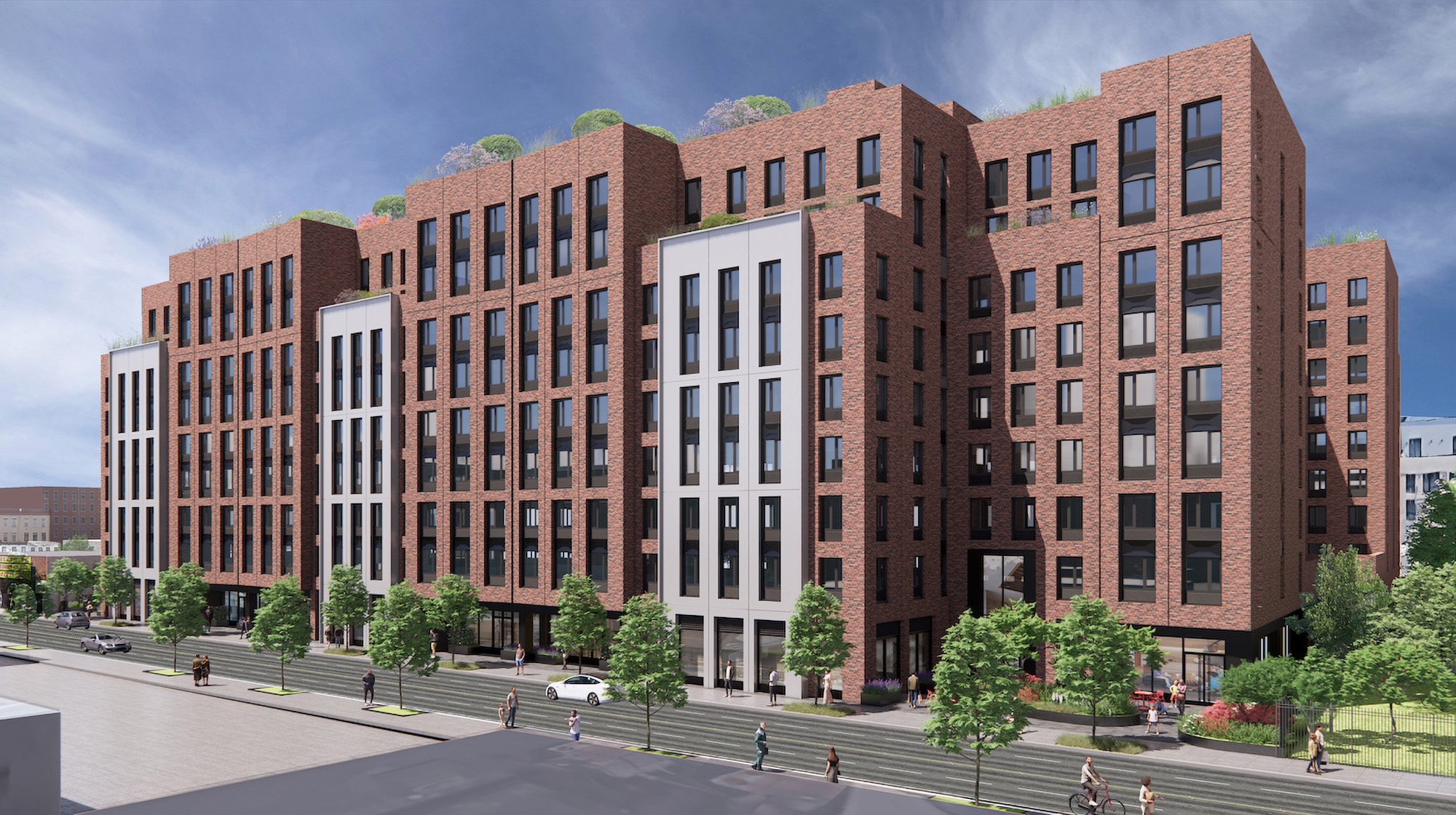Construction recently began on a project to create 328 units of permanently affordable and supportive homes for low-income and formerly homeless populations in Brooklyn, N.Y. The $237.9 million Clarkson Estates affordable housing development will be home to youth aging out of foster care, formerly incarcerated individuals, formerly homeless young adults, and formerly homeless families.
The project by CAMBA Housing Ventures, Inc. (CHV) targets Passive House certification and will offer more than 30,000 sf of community facility space including a broad array of onsite supportive services and recreational opportunities as well as nearly 15,000 sf of parking.
Passive House project elevates affordable housing in Brooklyn
Clarkson Estates is part of New York’s $1.4 billion Vital Brooklyn initiative, a community development program targeting and investing in eight integrated areas including healthcare and housing. The program’s aim is to establish a new standard for addressing chronic economic and health disparities in Central Brooklyn’s underserved communities. The initiative will create 4,000 affordable homes.
Clarkson Estates will transform the site that was formerly owned by The Health Science Center at Brooklyn Foundation, Inc. and used as a parking lot for SUNY Downstate Medical Center. CHV’s focus is on co-locating housing and healthcare to combine affordable housing and community resources to address the socio-economic determinants of health. CHV’s proven model of supportive services, nearby healthcare and on-site amenities helps transition families from survival to stability and success. CHV will provide tailored case management. Onsite community resources are focused on supporting economic development and workforce training, youth development and violence prevention, adult education and financial literacy, access to healthy food, recreation, and health and wellness.
The project will offer a mix of studios, one-, two-, and three-bedroom units at 30%, 40%, 50%, and 70% area median income (AMI). Clarkson Estates will be a 9-story brick and metal panel contextual building and feature a double-height lobby at both the residential and community facility entrances with plentiful access to natural light throughout common spaces. Amenities will include free Wi-Fi in units, 24/7 front desk security to enhance safety, extensive landscaping including courtyards and rooftop terraces to encourage socializing, a teaching kitchen for nutrition workshops, children’s playroom, computer room, indoor fitness center, laundry on every floor, flexible community rooms, bike storage, live-in superintendent, and local art throughout the building.
On the Building Team:
Owner and/or developer: CAMBA Housing Ventures, Inc.
Architect of record, design architect: CetraRuddy
MEP engineer: Dagher Engineering
Structural engineer: DeSimone Consulting Engineers
General contractor/construction manager: Bruno Frustaci Contracting
Related Stories
Multifamily Housing | Jun 29, 2023
5 ways to rethink the future of multifamily development and design
The Gensler Research Institute’s investigation into the residential experience indicates a need for fresh perspectives on residential design and development, challenging norms, and raising the bar.
Affordable Housing | Jun 27, 2023
Racial bias concerns prompt lawmakers to ask HUD to ban biometric surveillance, including facial recognition
Two members of the U.S. House of Representative have asked the Department of Housing and Urban Development to end the use of biometric technology, including facial recognition, for surveillance purposes in public housing.
Apartments | Jun 27, 2023
Average U.S. apartment rent reached all-time high in May, at $1,716
Multifamily rents continued to increase through the first half of 2023, despite challenges for the sector and continuing economic uncertainty. But job growth has remained robust and new households keep forming, creating apartment demand and ongoing rent growth. The average U.S. apartment rent reached an all-time high of $1,716 in May.
Urban Planning | Jun 15, 2023
Arizona limits housing projects in Phoenix area over groundwater supply concerns
Arizona will no longer grant certifications for new residential developments in Phoenix, it’s largest city, due to concerns over groundwater supply. The announcement indicates that the Phoenix area, currently the nation’s fastest-growing region in terms of population growth, will not be able to sustain its rapid growth because of limited freshwater resources.
Multifamily Housing | Jun 15, 2023
Alliance of Pittsburgh building owners slashes carbon emissions by 45%
The Pittsburgh 2030 District, an alliance of property owners in the Pittsburgh area, says that it has reduced carbon emissions by 44.8% below baseline. Begun in 2012 under the guidance of the Green Building Alliance (GBA), the Pittsburgh 2030 District encompasses more than 86 million sf of space within 556 buildings.
Industry Research | Jun 15, 2023
Exurbs and emerging suburbs having fastest population growth, says Cushman & Wakefield
Recently released county and metro-level population growth data by the U.S. Census Bureau shows that the fastest growing areas are found in exurbs and emerging suburbs.
Mixed-Use | Jun 6, 2023
Public-private partnerships crucial to central business district revitalization
Central Business Districts are under pressure to keep themselves relevant as they face competition from new, vibrant mixed-use neighborhoods emerging across the world’s largest cities.
Multifamily Housing | Jun 6, 2023
Minnesota expected to adopt building code that would cut energy use by 80%
Minnesota Gov. Tim Walz is expected to soon sign a bill that would change the state’s commercial building code so that new structures would use 80% less energy when compared to a 2004 baseline standard. The legislation aims for full implementation of the new code by 2036.
Multifamily Housing | Jun 1, 2023
Income-based electric bills spark debate on whether they would harm or hurt EV and heat pump adoption
Starting in 2024, the electric bills of most Californians could be based not only on how much power they use, but also on how much money they make. Those who have higher incomes would pay more; those with lower incomes would see their electric bills decline - a concept known as income-based electric bills.
Multifamily Housing | May 30, 2023
Boston’s new stretch code requires new multifamily structures to meet Passive House building requirements
Phius certifications are expected to become more common as states and cities boost green building standards. The City of Boston recently adopted Massachusetts’s so-called opt-in building code, a set of sustainability standards that goes beyond the standard state code.


















